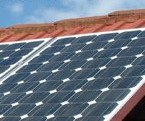While recent changes in government policy have caused grief for Australia’s home solar power sector, the Sustainable Energy Association of Australia (SEA) says this has created an even more competitive market, making it a great time to buy solar panels.
According to an industry survey released on Friday by the SEA, the Western Australia residential solar PV industry has experienced a rapid growth cycle, but dramatic changes in government subsidies have threatened the stability of businesses operating in the sector.
73% of Western Australian respondents participating in the survey stated sales and inquiries either peaked or fell immediately after reductions to the Western Australian feed-in tariff were announced. On average, companies expect to lay-off 49.3% of their employees and 42.9% of respondents expected the bulk of staff cuts to have occurred in September 2011.
The survey also found many solar businesses expect solar panel based electricity generation to hit retail grid parity without subsidies potentially by 2015. However, until that time, the sector will require some form of price support; gradually declining over lead-up period.
While solar businesses are doing it tough in Western Australia, SEA Chief Executive Prof. Ray Wills says households should be aware that with the price of electricity for both domestic and business customers increasing, solar power systems remain a good option. A rooftop solar array generates electricity that can potentially pay the investment in panels back within 6-7 years in combination with existing solar rebates. After that payback period, the electricity is essentially free.
“If a home owner uses all of the energy they generate from solar panels in their home, that electricity is worth in the Perth market a minimum of 21.7 c kWh. For enterprises on a business tariff, this may be worth even more. And of course it is a growing benefit saving money into the future because every future price in electricity increases the value of electricity generated on the roof of the new home.”
Prof. Wills also pointed out owners of rooftop solar arrays are “becoming more energy wise and actually manage their electricity use better”. Solar households reduce their electricity consumption on average 20% compared with non-solar homes, he says.
However, Prof. Wills cautions people considering making the switch to solar to research providers. “If you are looking to install a solar panel, choose a reputable supplier – one way to ensure this is to look for an installer that belongs to an industry body like the SEA.”
Related:












































